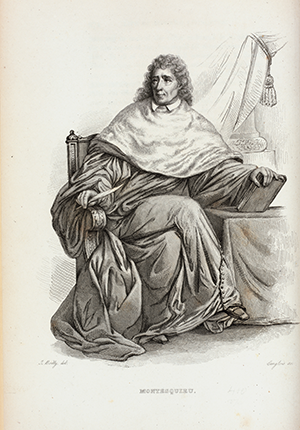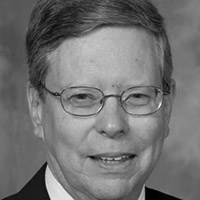Historic Document
The Spirit of the Laws (1748)
Montesquieu | 1748

Emmet Collection of Manuscripts Etc. Relating to American History, The New York Public Library
Summary
Charles-Louis de Secondat, baron de la Brède et de Montesquieu (1689-1755) was the author of the Persian Letters (1721), Considerations on the Causes of the Greatness of the Romans and of their Decline (1733), and of The Spirit of the Laws (1748). Described in The Federalist as “the celebrated Montesquieu,” he was more often consulted and cited in the period stretching from 1760 to 1800 than any other secular author – especially with regard to the institutions most likely to sustain political liberty and to the evils of slavery. In particular, Montesquieu’s discussion of separation of powers and checks and balances profoundly influenced the American Founders and the design of the U.S. Constitution. It was not unusual for eighteenth century Americans to speak of Montesquieu as an “oracle” of political wisdom whose work is “always consulted.”
Selected by

Paul Rahe
Professor of History and Charles O. Lee and Louise K. Lee Chair in the Western Heritage at Hillsdale College

Jeffrey Rosen
President and CEO, National Constitution Center

Colleen A. Sheehan
Professor of Politics at the Arizona State University School of Civic and Economic Thought and Leadership
Document Excerpt
3:1—There is no great share of probity necessary to support a monarchical or despotic government: the force of laws, in one, and the prince’s arm, in the other, are sufficient to direct and maintain the whole: but, in a popular state, one spring more is necessary, namely, virtue. . . .
When virtue is banished, ambition invades the minds of those who are disposed to receive it, and avarice possesses the whole community. . . . The members of the commonwealth riot on the public spoils, and its strength is only the power of a few, and the license of many.
4:5—It is in a republican government that the whole power of education is required. . . . [V]irtue is a self-renunciation, which is very arduous and painful.
This virtue may be defined as the love of the laws and of our country. As such love requires a constant preference of public to private interest, it is the source of all private virtues.
8:16—It is natural for a republic to have a small territory; otherwise it cannot subsist. In an extensive republic there are men of large fortunes, and consequently of less moderation; there are trusts too considerable to be placed on any single subject; he has interests of his own; he soon begins to think that he may be happy and glorious, by oppressing his fellow-citizens; and that he may raise himself to grandeur on the ruins of his country.
In an extensive republic, the public good is sacrificed to a thousand private views: it is subordinate to exceptions, and depends on accidents. In a small one, the interest of the public is more obvious, better understood, and more within the reach of every citizen.
9:1—If a republic be small, it is destroyed by a foreign force; if it be large, it is ruined by an internal imperfection. . . . The evil is in the very thing itself, and no form can redress it.
It is, therefore, very probable that mankind would have been, at length, obliged to live constantly under the government of a single person, had they not contrived a kind of constitution that has all the internal advantages of a republican, together with the external force of a monarchical government. I mean a confederate republic.
11:4—Democratic and aristocratic states are not in their own nature free. Political liberty is to be found only in moderate governments; and even in these it is not always found. It is there only when there is no abuse of power. But constant experience shows us that every man invested with power is apt to abuse it, and to carry his authority as far as it will go. Is it not strange, though true, to say that virtue itself has need of limits?
To prevent this abuse, it is necessary from the very nature of things that power should be a check to power. A government may be so constituted as no man shall be compelled to do things to which the law does not oblige him, nor forced to abstain from things which the law permits.
11:5—Though all governments have the same general end, which is that of preservation, yet each has another particular object. . . . One nation there is . . . in the world that has for the direct end of its constitution political liberty. We shall presently explain the principles on which this liberty is founded . . . .
11.6.—In every government there are three sorts of power: the legislative; the executive in respect to things dependent on the law of nations; and the executive in regard to matters that depend on the civil law.
By virtue of the first, the prince or magistrate enacts temporary or perpetual laws, and amends or abrogates those that have been already enacted. By the second, he makes peace or war, sends or receives embassies, establishes the public security, and provides against invasions. By the third, he punishes criminals, or determines the disputes that arise between individuals. The latter we shall call the judiciary power, and the other simply the executive power of the state.
The political liberty of the subject is a tranquility of mind arising from the opinion each person has of his safety. In order to have this liberty, it is requisite the government be so constituted as one man need not be afraid of another.
When the legislative and executive powers are united in the same person, or in the same body of magistrates, there can be no liberty; because apprehensions may arise, lest the same monarch or senate should enact tyrannical laws, to execute them in a tyrannical manner.
Again, there is no liberty, if the judiciary power be not separated from the legislative and executive. Were it joined with the legislative, the life and liberty of the subject would be exposed to arbitrary control; for the judge would be then the legislator. Were it joined to the executive power, the judge might behave with violence and oppression.
There would be an end of everything, were the same man or the same body, whether of the nobles or of the people, to exercise those three powers, that of enacting laws, that of executing the public resolutions, and of trying the causes of individuals.
15:1—Slavery, properly so called is the establishment of a right which gives to one man such a power over another as renders him absolute master of his life and fortune. The state of slavery is in its own nature bad. It is neither useful to the master nor to the slave; not to the slave, because he can do nothing through a motive of virtue; nor to the master, because by having an unlimited authority over his slaves he insensibly accustoms himself to the want of all moral virtues, and thence becomes fierce, hasty, severe, choleric, voluptuous, and cruel.
19:27—I have spoken in the eleventh book of a free people, and have given the principles of their constitution: let us now see the effects, which follow from this liberty, the character it is capable of forming, and the customs which naturally result from it. . . . .
As there are in this state two visible powers—the legislative and executive—and as every citizen has a will of his own and may at pleasure assert his independence, most men have a greater fondness for one of these powers than for the other, and the multitude have commonly neither equity nor sense enough to show an equal affection to both.
And as the executive power, by disposing of all employments, may give greater hopes, and no fears, every man who obtains any favor from it is ready to espouse its cause; while it is liable to be attacked by those who have nothing to hope from it.
All the passions being unrestrained, hatred, envy, jealousy, and an ambitious desire of riches and honors, appear in their extent; were it otherwise, the state would be in the condition of a man weakened by sickness, who is without passions because he is without strength.
The hatred which arises between the two parties will always subsist, because it will be impotent.
These parties being composed of freemen, if the one becomes too powerful for the other, as a consequence of liberty the other is depressed; while the citizens take the weaker side, with the same readiness as the hands lend their assistance to remove the infirmities and disorders of the body.
Every individual is independent, and being commonly led by caprice and humor, frequently changes parties; he abandons one where he left all his friends, to unite himself to another in which he finds all his enemies: so that in this nation it frequently happens that the people forget the laws of friendship, as well as those of hatred. . . .
This nation is passionately fond of liberty, because this liberty is real; and it is possible for it, in its defence, to sacrifice its wealth, its ease, its interest, and to support the burden of the heaviest taxes, even such as a despotic prince durst not lay upon his subjects.
If this nation sends colonies abroad, it must rather be to extend its commerce than its dominion.
As men are fond of introducing into other places what they have established amongst themselves, they have given the people of the colonies their own form of government; and this government carrying prosperity along with it, they have raised great nations in the forests they were sent to inhabit.




